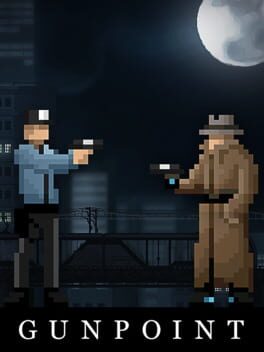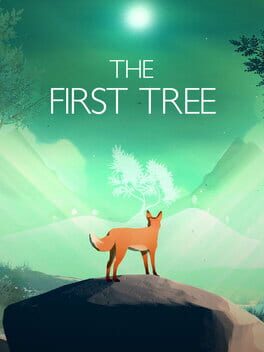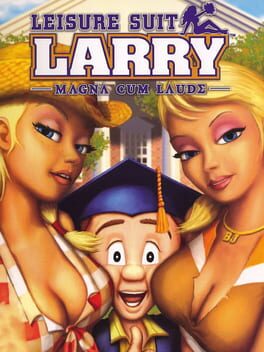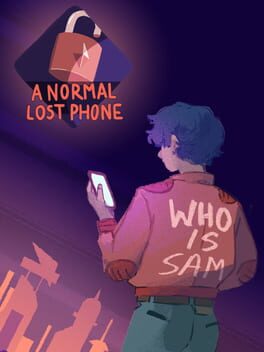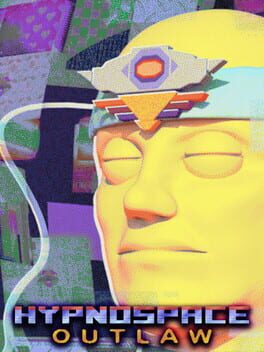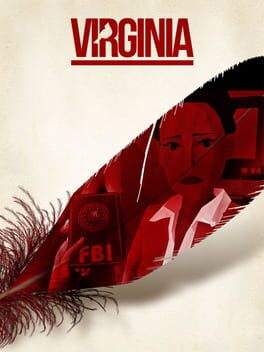109 Reviews liked by Ping
Gunpoint
2013
Simultaneously 50's noir revisionism & a platforming rendition of Uplink. Leaves too much room for different guard types, varying objectives each level other than "hacking", & a slightly more compelling narrative to guide the player for it to be anything other than a smoothly satisfying romp. Really makes you believe that you too, yes you! could survive jumping out of a window on the 9th story of a building!
Scotch is on me, & on the rocks.
Scotch is on me, & on the rocks.
Overboard!
2021
Immediately brought in by the lovely music and jazzy 30s storybook art, stayed for the whole unraveling puzzle after the immaculate dialogue and cast machinations. And honestly she's just like me yknow, just desperately wanting to be free and in the best case scenario, helping a lost soul who felt the same. Just so ~grand~ it brought a large smile to my face as I kept going from start to end at a rapid pace.
The First Tree
2017
i genuinely think it would be a better world if more narrative-driven interpersonal adventure games adopted LSL:MCM's Undertale-esque bullet hell conversation minigame at the bottom of the screen where you're a little cartoon spermatozoon dodging obstacles and every time you hit one during an interaction with a hot babe you burp fart or jizz
Overboard!
2021
As ever when it comes to Inkle, the writing is the highlight.
A single run is about 30 minutes, but the game really rewards repeat playthroughs as spending more time onboard with your fellow passengers elicits more information about them, their own stories and relationships, and all these little details can help you plan the perfect crime.
A single run is about 30 minutes, but the game really rewards repeat playthroughs as spending more time onboard with your fellow passengers elicits more information about them, their own stories and relationships, and all these little details can help you plan the perfect crime.
Overboard!
2021
A really fun text adventure game that twists a detective story, making you the murderer attempting to get away with the crime. With tons of dialogue branches, the game manages to feel dynamic despite the story only taking place across dialogue boxes. Chipping away at characters' backstories to craft the perfect crime is exhilarating and makes for great, snappy play sessions. Really looking forward to playing more from this studio!
The Beginner's Guide
2015
This review contains spoilers
So, this is my favorite game of all time and I can’t talk about how much I appreciate it without spoiling it. It takes an hour and a half to complete and is only $10 on Steam, and I've seen it go down to $4 before. Please go play this one before reading, I obviously think it’s worth it. Okay, here I go:
This is probably not the game most people would consider as having great gameplay, but I’m going to make my case for this having the most interesting gameplay I’ve experienced in a game. About 95% of this game’s mechanics consist of simply walking around some levels while a narrator talks. But it’s the different ways in which the game can alter how you can walk around and use that to effect what the player is feeling and effectively communicate different messages to the player that is so damn creative. This is the game I point to whenever someone tries to say that “walking simulators aren’t real video games” because this game proves that with just the mechanic of walking through a level, you can communicate so many ideas to the player, in a way that couldn’t be done in any other medium. There are also occasional bits of dialogue choices and shooting and one puzzle that is just an incredible metaphor. This game, in an hour and a half, is bursting with so many creative ideas on how to use the medium of video games, more than any other game I can think of.
Okay, let’s get into some of the ideas this game is playing with here. First, it’s worth noting that a part of this game’s narrative is that you can’t ever actually know what the author of any given work is trying to say, unless they explicitly tell you what they’re trying to say. I highly recommend watching Innuendo Studios’ video about The Beginner’s Guide for an exploration of that idea. That being said, here’s my interpretation of the game: The game is presented as the narrator, Davey Wreden (who is also the developer), takes you through a collection of experimental games made by his friend Coda. As you get further and further into Coda’s games, the games start delving into darker ideas dealing with Coda losing his creativity and developing depression. Where the ideas used to flow so naturally to him, they’ve just stopped coming, and it’s getting harder and harder for him to keep making games. Davey begins the game so proud and inspired by Coda’s work, and in the later bits he’s understandably worried about his friend because of the messages he’s getting from his later games. While Davey shows off Coda’s work to the player, there are certain bits he’ll skip you past, or speed up, so that the player can get on with the rest of the game. Davey has an idea when playing Coda’s later games to start showing Coda’s work to people, to show Coda how much people love his work, to give him some positive feedback to keep going. Then, at the end of the game, there’s a twist, one last game that Coda makes for Davey specifically. In that game, Coda tells Davey that he doesn’t want to be friends anymore, that he was fine, and hated how Davey was projecting a negative image onto Coda himself, when he played Coda’s games; and how Coda felt violated when Davey kept showing his work to people without his permission. At this point as the player, I felt pretty dirty, like I was tricked into violating Coda’s privacy by Davey by playing this game. Afterwards, I just sat and thought about the game for a while, and realized that Coda isn’t a real person. That’s the other twist. Coda is, in my interpretation, a metaphor for the more introverted and artistic side of Davey. And after realizing that, I had to immediately play the game a second time, and suddenly everything Davey was saying took on a new meaning.
I 👏 love 👏 the 👏 puzzle 👏 in 👏 this 👏 game 👏. The way that Davey interprets the puzzle as a space between moments in your life, where you can stop and reflect for a while before moving on, but you must always, inevitably, move on, or you just get stuck in this dark place and stagnate. But we see in the house cleaning game, that Coda doesn’t agree with this. The way Coda originally made the house cleaning game, he was content to stay in the house forever, as if to say, it’s okay to find a place you’re comfortable in and stay there. Exiting the house was something that Davey added to Coda’s game. He viewed it as a flaw in the game that he was fixing. I honestly think there’s value in both of those views on the puzzle metaphor.
Another thing Davey changes in Coda’s games are the lamp posts he adds. Coda is fine letting his games be experimental, be endless. But Davey feels the need to add these lamp posts as a goal to work towards, he feels the need to influence Coda’s work and add a structure that Coda was happy without. Davey also feels the need to show Coda’s work to others. I read these as meaning that there is an internal conflict in Davey, between a part of himself which needs external validation, and needs to make games in a way that other people will like; while Coda, his more introverted self, is more happy with making games just for himself, as a way to have some introspection and explore ideas without having to worry about what other people think of it. Coda doesn’t want to give his games away, his games are for him. I recommend clicking this link and reading Davey Wreden’s blog post “Game of the Year” in which he talks about his depression during the time when The Stanley Parable was winning awards, and how he felt like he lost a sense of ownership when he released that game. It sheds a light on the internal conflict of this game. Here’s the link: http://web.archive.org/.../http://www.galactic-cafe.com/
In Coda’s later games, the machine which allows him to make games stops working. It’s revealed that the machine is Coda, and it’s put on trial for letting down the public. This, to me, is clearly Davey saying that he’s losing touch with the part of himself that is willing to take creative risks, and make personal works of art that are meaningful to himself first and foremost. And he feels a sense of shame for letting down people around him when he fails to create like this. The last puzzle in the game is my favorite moment in any game. It’s the moment after Davey gets Coda’s message about how he doesn’t want to be friends anymore, and he wishes that Davey would stop altering his work, and stop violating his privacy. In that puzzle room, there is no second lever to exit the puzzle with. It forces Davey to stay in the room, and contemplate what he’s done. And in that room, Davey begs for Coda to come back, and give him the sense of wholeness that came to Coda so effortlessly. Stuck in this dark room with no escape, Davey says that he’s fading, and just wants to know that it will be okay. Davey feels that he’s lost touch with this part of himself, and this whole game is him expressing his desire to reestablish a connection with that part of himself. And then the brilliantly executed epilogue, walking through Coda’s works, and moving forward through other levels with nothing to interact with, and no more narration, just left to digest everything that just happened. And then you walk into this pillar of light and get the final shot of the game, floating upwards and looking down on this massive labyrinth that consumes everything, and makes you feel so small in comparison. Makes you contemplate the enormous complexities of a person that you could never see before, and how small we can feel when confronted with that.
This is probably not the game most people would consider as having great gameplay, but I’m going to make my case for this having the most interesting gameplay I’ve experienced in a game. About 95% of this game’s mechanics consist of simply walking around some levels while a narrator talks. But it’s the different ways in which the game can alter how you can walk around and use that to effect what the player is feeling and effectively communicate different messages to the player that is so damn creative. This is the game I point to whenever someone tries to say that “walking simulators aren’t real video games” because this game proves that with just the mechanic of walking through a level, you can communicate so many ideas to the player, in a way that couldn’t be done in any other medium. There are also occasional bits of dialogue choices and shooting and one puzzle that is just an incredible metaphor. This game, in an hour and a half, is bursting with so many creative ideas on how to use the medium of video games, more than any other game I can think of.
Okay, let’s get into some of the ideas this game is playing with here. First, it’s worth noting that a part of this game’s narrative is that you can’t ever actually know what the author of any given work is trying to say, unless they explicitly tell you what they’re trying to say. I highly recommend watching Innuendo Studios’ video about The Beginner’s Guide for an exploration of that idea. That being said, here’s my interpretation of the game: The game is presented as the narrator, Davey Wreden (who is also the developer), takes you through a collection of experimental games made by his friend Coda. As you get further and further into Coda’s games, the games start delving into darker ideas dealing with Coda losing his creativity and developing depression. Where the ideas used to flow so naturally to him, they’ve just stopped coming, and it’s getting harder and harder for him to keep making games. Davey begins the game so proud and inspired by Coda’s work, and in the later bits he’s understandably worried about his friend because of the messages he’s getting from his later games. While Davey shows off Coda’s work to the player, there are certain bits he’ll skip you past, or speed up, so that the player can get on with the rest of the game. Davey has an idea when playing Coda’s later games to start showing Coda’s work to people, to show Coda how much people love his work, to give him some positive feedback to keep going. Then, at the end of the game, there’s a twist, one last game that Coda makes for Davey specifically. In that game, Coda tells Davey that he doesn’t want to be friends anymore, that he was fine, and hated how Davey was projecting a negative image onto Coda himself, when he played Coda’s games; and how Coda felt violated when Davey kept showing his work to people without his permission. At this point as the player, I felt pretty dirty, like I was tricked into violating Coda’s privacy by Davey by playing this game. Afterwards, I just sat and thought about the game for a while, and realized that Coda isn’t a real person. That’s the other twist. Coda is, in my interpretation, a metaphor for the more introverted and artistic side of Davey. And after realizing that, I had to immediately play the game a second time, and suddenly everything Davey was saying took on a new meaning.
I 👏 love 👏 the 👏 puzzle 👏 in 👏 this 👏 game 👏. The way that Davey interprets the puzzle as a space between moments in your life, where you can stop and reflect for a while before moving on, but you must always, inevitably, move on, or you just get stuck in this dark place and stagnate. But we see in the house cleaning game, that Coda doesn’t agree with this. The way Coda originally made the house cleaning game, he was content to stay in the house forever, as if to say, it’s okay to find a place you’re comfortable in and stay there. Exiting the house was something that Davey added to Coda’s game. He viewed it as a flaw in the game that he was fixing. I honestly think there’s value in both of those views on the puzzle metaphor.
Another thing Davey changes in Coda’s games are the lamp posts he adds. Coda is fine letting his games be experimental, be endless. But Davey feels the need to add these lamp posts as a goal to work towards, he feels the need to influence Coda’s work and add a structure that Coda was happy without. Davey also feels the need to show Coda’s work to others. I read these as meaning that there is an internal conflict in Davey, between a part of himself which needs external validation, and needs to make games in a way that other people will like; while Coda, his more introverted self, is more happy with making games just for himself, as a way to have some introspection and explore ideas without having to worry about what other people think of it. Coda doesn’t want to give his games away, his games are for him. I recommend clicking this link and reading Davey Wreden’s blog post “Game of the Year” in which he talks about his depression during the time when The Stanley Parable was winning awards, and how he felt like he lost a sense of ownership when he released that game. It sheds a light on the internal conflict of this game. Here’s the link: http://web.archive.org/.../http://www.galactic-cafe.com/
In Coda’s later games, the machine which allows him to make games stops working. It’s revealed that the machine is Coda, and it’s put on trial for letting down the public. This, to me, is clearly Davey saying that he’s losing touch with the part of himself that is willing to take creative risks, and make personal works of art that are meaningful to himself first and foremost. And he feels a sense of shame for letting down people around him when he fails to create like this. The last puzzle in the game is my favorite moment in any game. It’s the moment after Davey gets Coda’s message about how he doesn’t want to be friends anymore, and he wishes that Davey would stop altering his work, and stop violating his privacy. In that puzzle room, there is no second lever to exit the puzzle with. It forces Davey to stay in the room, and contemplate what he’s done. And in that room, Davey begs for Coda to come back, and give him the sense of wholeness that came to Coda so effortlessly. Stuck in this dark room with no escape, Davey says that he’s fading, and just wants to know that it will be okay. Davey feels that he’s lost touch with this part of himself, and this whole game is him expressing his desire to reestablish a connection with that part of himself. And then the brilliantly executed epilogue, walking through Coda’s works, and moving forward through other levels with nothing to interact with, and no more narration, just left to digest everything that just happened. And then you walk into this pillar of light and get the final shot of the game, floating upwards and looking down on this massive labyrinth that consumes everything, and makes you feel so small in comparison. Makes you contemplate the enormous complexities of a person that you could never see before, and how small we can feel when confronted with that.
Outer Wilds
2019
When I first played Outer Wilds in 2019, I found it to be a game of high highs and low lows. The first few hours were filled with an unparalleled sense of wonder and discovery as I journeyed through space uncovering the secrets of an ancient civilization. The game fits together perfectly like a five-dimensional jigsaw puzzle, every piece shedding new light on everything you already know no matter which order you encounter them in. It's the only game I've ever played that feels in the tradition of Riven, the best puzzle game ever made.
But as time went on, I started to approach the point where I could no longer go in any direction and find something new and magical within minutes. My path lay deeper into the depths of places I'd already visited, and inevitably these paths were fraught with danger, requiring careful movement and precise timing to avoid death. And every death restarted the loop and required minutes on end of navigating back to the same location, often waiting for one precise time in the cycle, and then often as not simply dying again.
It was too much. I simply gave up. I consider myself fairly technically proficient in the art of the controller, but it wasn't enough. I was spending hours throwing myself against the same nitty platforming challenge and coming away from it no more skilled for my efforts. I rated the game 3.5 stars—some magical moments but too frustrating to bear—and moved on.
Two years later, my friend Cera came over for only the second time after both of us were vaccinated against COVID-19. Cera loves this game and the thought that I hadn't seen the ending dismayed her so much she offered to simply do the hard parts for me. And she was right! The last few hours of Outer Wilds were thoughtful and heartbreaking, evoking pathos and catharsis every bit as effectively as the first few hours evoked wonder.
My opinion on the middle section of this game hasn't softened: I still think it's a major flaw to require such high dexterity in a game that also requires between two and twenty minutes of downtime between each attempt. But the quality of the ending and the way it complements the best parts of the beginning is worth even that. Play Outer Wilds.
But as time went on, I started to approach the point where I could no longer go in any direction and find something new and magical within minutes. My path lay deeper into the depths of places I'd already visited, and inevitably these paths were fraught with danger, requiring careful movement and precise timing to avoid death. And every death restarted the loop and required minutes on end of navigating back to the same location, often waiting for one precise time in the cycle, and then often as not simply dying again.
It was too much. I simply gave up. I consider myself fairly technically proficient in the art of the controller, but it wasn't enough. I was spending hours throwing myself against the same nitty platforming challenge and coming away from it no more skilled for my efforts. I rated the game 3.5 stars—some magical moments but too frustrating to bear—and moved on.
Two years later, my friend Cera came over for only the second time after both of us were vaccinated against COVID-19. Cera loves this game and the thought that I hadn't seen the ending dismayed her so much she offered to simply do the hard parts for me. And she was right! The last few hours of Outer Wilds were thoughtful and heartbreaking, evoking pathos and catharsis every bit as effectively as the first few hours evoked wonder.
My opinion on the middle section of this game hasn't softened: I still think it's a major flaw to require such high dexterity in a game that also requires between two and twenty minutes of downtime between each attempt. But the quality of the ending and the way it complements the best parts of the beginning is worth even that. Play Outer Wilds.
Evan's Remains
2020
Outer Wilds
2019
truly one of those games i wish i could wipe from my brain and play through for the first time again. Outer Wilds is such an expertly designed, tightly written and gorgeous game with real moments of existential horror and fear, while also having moments of quiet tenderness and revelation that make the experience cripplingly addictive. i found it was hard to get into at first, considering you're basically given free access to the entire solar system right off the bat, but once you start really getting into the story, simply uncovering the mystery at the core of this game becomes the incentive to keep playing. one of the best games of all time!
A Normal Lost Phone
2017
I had no idea what to expect. I kept guessing what was happening, and every guess I had was correct. No real surprises. Sort of.
A lot of the texts and websites are straight-up leaflets, meticulously placed to introduce someone unaware of the topic. Crafted Tumblr posts that, in the spanish translation, had some missteps.
But maybe, because of how touchy of a subject it is for me, I got "something" out of the protagonist's messages and experiences, as little as that "something" could be. How some messages in that phone were quite natural and stored a hidden truth that spoke to me
A lot of the texts and websites are straight-up leaflets, meticulously placed to introduce someone unaware of the topic. Crafted Tumblr posts that, in the spanish translation, had some missteps.
But maybe, because of how touchy of a subject it is for me, I got "something" out of the protagonist's messages and experiences, as little as that "something" could be. How some messages in that phone were quite natural and stored a hidden truth that spoke to me
This review contains spoilers
a post-modern review for a post-modern game:
who would have thought the dude who made the Universal Controller Fix (look it up) for Super Smash Brothers Melee players could pull something like this out of his back pocket? a welcome surprise at the time of release (i'm sure), but more of a long overdue chore to play four years after the fact.
it's hard to pitch this game without "spoiling" that there is a "turn" that happens in it, which is maybe a fault of the Moe Trash genre as a whole. it's like if Michael Haneke's "Funny Games" was written by someone who was more knowledgeable about the genre the story was about but somehow more annoying. this game does some very cool things though, which brings it up to 3 stars for me. however, being post-modern alone isn't enough to shock me anymore, at least not since Metal Gear Solid 2 (sorry).
narratives surrounding "mental health" and "sensitive topics" tend to get overblown a lot in games, and this is no exception. maybe i'm just desensitized to queer people's writing where they talk about wanting to kill themselves in graphic (and, frankly, more creative) ways a lot, but the "turn" in this game is less of a shock and more of a welcome release from the tedium that proceeds it. the pacing of this game could be faster and it would be better for it.
there is no "best girl," there never was. bye.
who would have thought the dude who made the Universal Controller Fix (look it up) for Super Smash Brothers Melee players could pull something like this out of his back pocket? a welcome surprise at the time of release (i'm sure), but more of a long overdue chore to play four years after the fact.
it's hard to pitch this game without "spoiling" that there is a "turn" that happens in it, which is maybe a fault of the Moe Trash genre as a whole. it's like if Michael Haneke's "Funny Games" was written by someone who was more knowledgeable about the genre the story was about but somehow more annoying. this game does some very cool things though, which brings it up to 3 stars for me. however, being post-modern alone isn't enough to shock me anymore, at least not since Metal Gear Solid 2 (sorry).
narratives surrounding "mental health" and "sensitive topics" tend to get overblown a lot in games, and this is no exception. maybe i'm just desensitized to queer people's writing where they talk about wanting to kill themselves in graphic (and, frankly, more creative) ways a lot, but the "turn" in this game is less of a shock and more of a welcome release from the tedium that proceeds it. the pacing of this game could be faster and it would be better for it.
there is no "best girl," there never was. bye.
Hypnospace Outlaw
2019
A loveletter to VNs, except that the writer clearly hates VNs so in that regard DDLC is only one step above shitty ironic VNs that get regurgitated out for short-term cashgrabs. This is exacerbated by how much the game reinforces generic dating sim tropes, instead of acknowledging the strengths of the VN genre/medium. The one silver lining is that the game is genuinely scary/atmospheric at parts (I'm weak to glitch horror so it doesn't have to be particularly good to scare me though).
EDIT: After reading the links posted in the comments of this review, I no longer think that Dan Salvato secretly hates VNs or anything like that, but I still feel as though DDLC fails to be an effective loveletter to VNs just because of how heavily it reinforces generic dating sim tropes.
EDIT EDIT: Ignore the previous edit. This game is disrespectful to VNs and survivors of suicide-related trauma and Dan Salvato is a hack.
EDIT: After reading the links posted in the comments of this review, I no longer think that Dan Salvato secretly hates VNs or anything like that, but I still feel as though DDLC fails to be an effective loveletter to VNs just because of how heavily it reinforces generic dating sim tropes.
EDIT EDIT: Ignore the previous edit. This game is disrespectful to VNs and survivors of suicide-related trauma and Dan Salvato is a hack.
